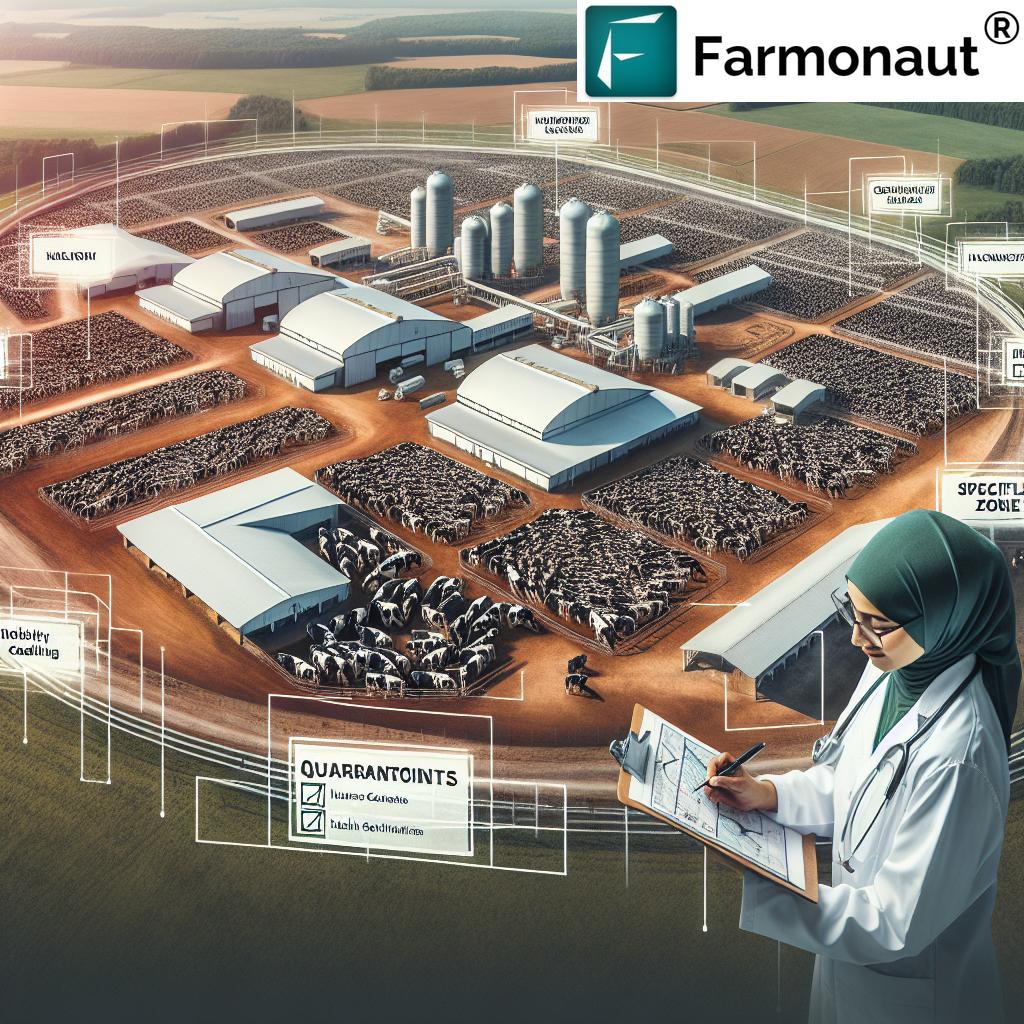Wisconsin’s New Lactating Dairy Cattle Movement Regulations: Farmonaut’s Guide to Compliance and Biosecurity
“New Wisconsin regulations require Certificates of Veterinary Inspection and Influenza A testing for interstate dairy cattle movement.”
Welcome to Farmonaut’s comprehensive guide on Wisconsin’s new lactating dairy cattle movement regulations. As leaders in agricultural technology, we understand the critical importance of staying informed about the latest industry developments. These new regulations are reshaping the landscape of dairy farm management, and we’re here to help you navigate these changes effectively.

Understanding the New Regulations
The Wisconsin Department of Agriculture, Trade and Consumer Protection (DATCP) has implemented new regulations for the movement of lactating dairy cattle. These changes are designed to enhance biosecurity measures and protect the health of Wisconsin’s valuable dairy herds. As a dairy farmer or agricultural producer, it’s crucial to understand and comply with these regulations to ensure smooth operations and avoid potential penalties.
Key Changes in Lactating Cow Movement Regulations
- Certificates of Veterinary Inspection (CVI): Now required for interstate movement of lactating dairy cattle.
- Influenza A Testing: Mandatory for certain types of cattle movement.
- Enhanced Documentation: Additional paperwork needed for various movement scenarios.
- Specific Guidelines: New rules for fairs, shows, and exhibitions.
These regulations affect all aspects of dairy cattle transportation, from farm-to-farm movements to participation in agricultural events. Let’s delve deeper into each aspect to ensure you’re fully prepared for compliance.
Certificates of Veterinary Inspection (CVI)
One of the most significant changes is the requirement for Certificates of Veterinary Inspection for interstate movement of lactating dairy cattle. This document, issued by a licensed veterinarian, certifies that the animal is free from signs of infectious, contagious, or communicable disease.
CVI Requirements:
- Must be issued within 30 days of movement
- Should include complete animal identification
- Must state the purpose of movement
- Requires signature of both the veterinarian and the owner/shipper
At Farmonaut, we understand the importance of efficient documentation. Our digital platform can help you manage and store these certificates, ensuring easy access and compliance during transportation.
Influenza A Testing
The new regulations also introduce mandatory Influenza A testing for certain movement scenarios. This measure aims to prevent the spread of respiratory diseases among dairy herds.
Testing Requirements:
- Required for interstate movement of lactating dairy cattle
- Must be conducted within 72 hours prior to movement
- Test results must be negative and documented on the CVI
Farmonaut’s health tracking features can help you manage test schedules and results, ensuring you never miss a crucial deadline for cattle movement.
Enhanced Documentation for Various Movement Scenarios
The new regulations introduce different documentation requirements based on the type and purpose of cattle movement. Let’s break down these scenarios:
| Movement Type | CVI Required | Influenza A Testing | Additional Documentation | Farmonaut Solution |
|---|---|---|---|---|
| Interstate Transport | Yes | Required | Official ID, Health Records | Digital CVI Storage, Test Scheduling |
| In-state Fairs | Yes | Not Required | Exhibition Permit | Permit Management System |
| Out-of-state Shows | Yes | Required | Show Registration, Health Records | Comprehensive Document Management |
| Farm-to-Farm (In-state) | No | Not Required | Owner Statement | Digital Owner Statement Generator |
| Auction Markets | Yes | Required | Market Records | Integrated Market Documentation System |
This table provides a quick reference for the various movement scenarios and their corresponding requirements. Farmonaut’s suite of tools can assist with managing each of these documentation needs, streamlining your compliance process.
“Compliance with updated biosecurity measures affects over 7,000 licensed dairy herds in Wisconsin, impacting millions of cattle annually.”
Specific Guidelines for Fairs, Shows, and Exhibitions
Agricultural events like fairs, shows, and exhibitions play a crucial role in the dairy industry. The new regulations introduce specific guidelines for these events to ensure biosecurity while allowing for the continuation of these important gatherings.
Key Points for Event Participation:
- Pre-Event Health Checks: All participating cattle must undergo a health check before entering the event premises.
- On-Site Veterinary Presence: Events must have a licensed veterinarian available for the duration of the gathering.
- Isolation Areas: Designated areas must be available for any animals showing signs of illness.
- Record Keeping: Detailed records of all participating animals, including their origin and destination, must be maintained.
Farmonaut’s event management tools can help organizers and participants alike in maintaining these records and ensuring compliance with the new guidelines.
Explore Farmonaut’s API for enhanced data management

Impact on Livestock Transportation Practices
The new regulations significantly impact livestock transportation practices. Dairy farmers and transporters need to adapt their procedures to ensure compliance and maintain the health of their herds.
Key Changes in Transportation Practices:
- Pre-Transport Health Checks: More rigorous health assessments before loading cattle.
- Cleaner Transport Vehicles: Enhanced cleaning and disinfection protocols for vehicles.
- Route Planning: Careful planning to minimize stops and potential exposure during transit.
- Documentation During Transit: Drivers must carry and be ready to present all required documentation.
Farmonaut’s fleet management tools can assist in optimizing routes, scheduling vehicle cleaning, and ensuring all necessary documentation is readily available during transport.
Evolving Standards in Animal Health Certificates
The new regulations have led to evolving standards in animal health certificates. These changes aim to provide more comprehensive health information and improve traceability in the event of a disease outbreak.
New Standards for Health Certificates:
- Digital Formats: Increasing acceptance of digital health certificates for easier storage and retrieval.
- Detailed Health History: More comprehensive health records required, including vaccination history.
- Unique Identification: Emphasis on unique identifiers like ear tags for improved traceability.
- Real-Time Updates: Systems for real-time updates to health status during transit.
Farmonaut’s digital health record system aligns perfectly with these evolving standards, allowing for easy creation, storage, and retrieval of comprehensive health certificates.
Check out our API Developer Docs for integration possibilities
Farmonaut’s Agritech Solutions for Compliance
At Farmonaut, we’re committed to helping dairy farmers and agribusinesses navigate these new regulations with ease. Our cutting-edge agritech solutions are designed to streamline compliance processes and enhance overall dairy farm management.
How Farmonaut Can Help:
- Digital Documentation Management: Store and retrieve CVIs, test results, and other required documents with ease.
- Health Tracking System: Monitor and schedule health checks, vaccinations, and tests for your entire herd.
- Transportation Logistics: Optimize routes and manage fleet cleaning schedules to ensure compliant transportation.
- Real-Time Alerts: Receive notifications for upcoming document expirations or required tests.
- Integration with Regulatory Systems: Seamless data sharing with relevant agricultural authorities when required.
Our platform is designed to adapt to the changing regulatory landscape, ensuring that your dairy operation remains compliant and efficient.
Agricultural Biosecurity Measures
The new regulations place a strong emphasis on agricultural biosecurity measures. These practices are crucial for preventing the introduction and spread of diseases within and between dairy herds.
Key Biosecurity Measures:
- Visitor Protocols: Implementing strict protocols for farm visitors to minimize disease introduction.
- Quarantine Procedures: Establishing quarantine areas for new or returning animals.
- Equipment Sanitation: Regular cleaning and disinfection of farm equipment and vehicles.
- Feed and Water Management: Ensuring clean and uncontaminated feed and water sources.
- Worker Training: Educating farm workers on biosecurity practices and their importance.
Farmonaut’s platform includes features to help manage and track these biosecurity measures, ensuring your farm maintains the highest standards of health and safety.
Compliance Challenges and Solutions
While these new regulations are crucial for maintaining herd health and industry standards, they can present challenges for dairy farmers. Let’s explore some common compliance challenges and how Farmonaut can help address them.
Common Challenges:
- Keeping Up with Paperwork: The increased documentation requirements can be overwhelming.
- Scheduling Health Checks and Tests: Coordinating timely veterinary visits and lab tests can be complex.
- Maintaining Accurate Records: Ensuring all records are up-to-date and easily accessible during inspections.
- Adapting to Digital Systems: Transitioning from paper-based to digital record-keeping can be daunting.
Farmonaut’s Solutions:
- Automated Document Management: Our system organizes and stores all necessary documents, sending reminders for renewals and updates.
- Integrated Scheduling Tools: Easily schedule and track health checks, tests, and veterinary visits within our platform.
- Real-Time Record Updates: Update records on-the-go using our mobile app, ensuring your information is always current.
- User-Friendly Interface: Our intuitive design makes the transition to digital record-keeping smooth and stress-free.
By leveraging Farmonaut’s technology, dairy farmers can turn these compliance challenges into opportunities for improved farm management and efficiency.
The Role of Technology in Dairy Farm Compliance
As the dairy industry evolves, technology plays an increasingly crucial role in ensuring compliance with regulations while improving overall farm management. Farmonaut is at the forefront of this technological revolution in agriculture.
Technology’s Impact on Compliance:
- Data Analytics: Utilizing big data to predict health trends and optimize herd management.
- IoT Devices: Employing sensors for real-time monitoring of animal health and environmental conditions.
- Blockchain for Traceability: Implementing blockchain technology for secure and transparent record-keeping.
- AI-Powered Decision Support: Using artificial intelligence to assist in compliance-related decision-making.
Farmonaut integrates these cutting-edge technologies into our platform, providing dairy farmers with powerful tools to maintain compliance and improve their operations.
Future Trends in Dairy Cattle Movement Regulations
As we look to the future, it’s important to anticipate potential trends in dairy cattle movement regulations. Staying ahead of these trends can help farmers prepare for future compliance requirements.
Anticipated Future Trends:
- Increased Focus on Sustainability: Regulations may start incorporating environmental impact considerations.
- Enhanced Traceability Requirements: More stringent tracking of cattle movement throughout their lifecycle.
- Integration of Genomic Data: Potential use of genetic information in health certifications and movement decisions.
- Global Harmonization of Standards: Movement towards internationally recognized standards for cattle health and movement.
Farmonaut is committed to evolving our platform to meet these future challenges, ensuring that our users are always ahead of the curve in regulatory compliance.
Conclusion
Wisconsin’s new lactating dairy cattle movement regulations represent a significant shift in the industry’s approach to biosecurity and animal health. While these changes may seem daunting, they are crucial for maintaining the health and productivity of dairy herds across the state and beyond.
At Farmonaut, we’re dedicated to supporting dairy farmers and agribusinesses through these transitions. Our comprehensive agritech solutions are designed to simplify compliance, streamline operations, and ultimately contribute to the success of your dairy farm.
By embracing these new regulations and leveraging technology to assist in compliance, dairy farmers can not only meet regulatory requirements but also improve their overall farm management practices. The future of dairy farming is data-driven, and Farmonaut is here to help you navigate this exciting new landscape.
Stay informed, stay compliant, and let Farmonaut be your partner in dairy farm excellence.
FAQ Section
- Q: How often do I need to obtain a new Certificate of Veterinary Inspection for my lactating dairy cattle?
A: CVIs must be obtained within 30 days of movement for interstate transport. For in-state movements, requirements may vary, so it’s best to check with local authorities. - Q: Is Influenza A testing required for all cattle movements?
A: No, Influenza A testing is primarily required for interstate movement of lactating dairy cattle. In-state movements may have different requirements. - Q: How can Farmonaut help me manage my health certificates and test results?
A: Farmonaut provides a digital platform for storing, managing, and retrieving all your health certificates and test results. Our system also sends reminders for upcoming expirations or required tests. - Q: Are there specific biosecurity measures required for participating in fairs and exhibitions?
A: Yes, fairs and exhibitions typically require pre-event health checks, on-site veterinary presence, and designated isolation areas. Farmonaut can help you manage these requirements effectively. - Q: How do I ensure my transportation practices comply with the new regulations?
A: Ensure you have all required documentation, conduct pre-transport health checks, maintain clean transport vehicles, and plan routes carefully. Farmonaut’s fleet management tools can assist with these processes.
















